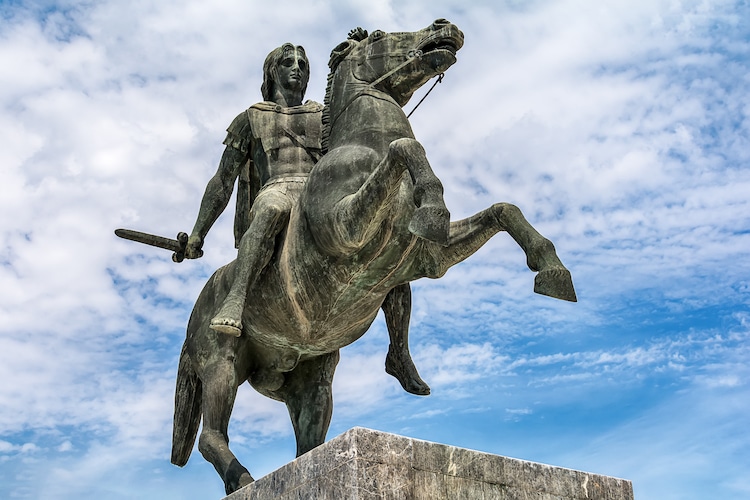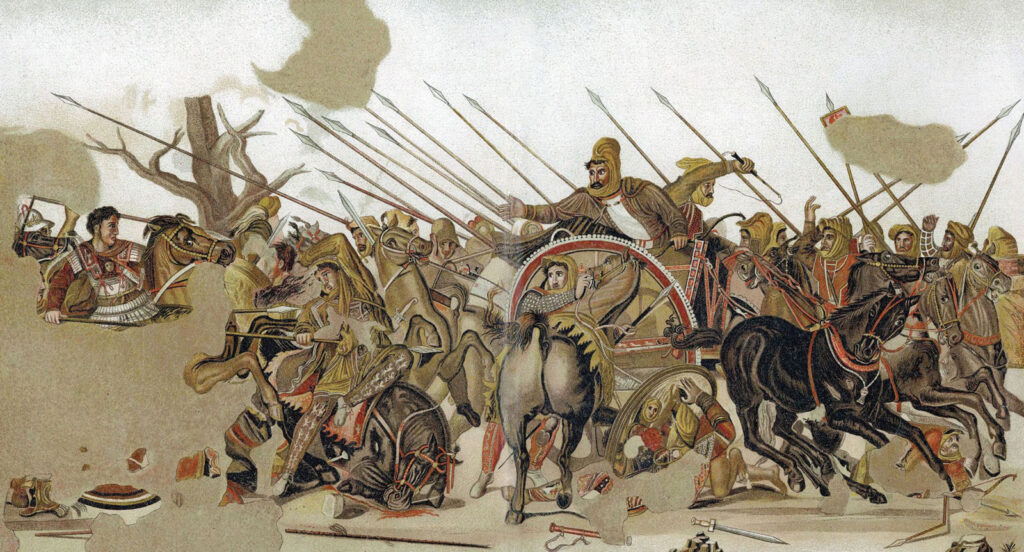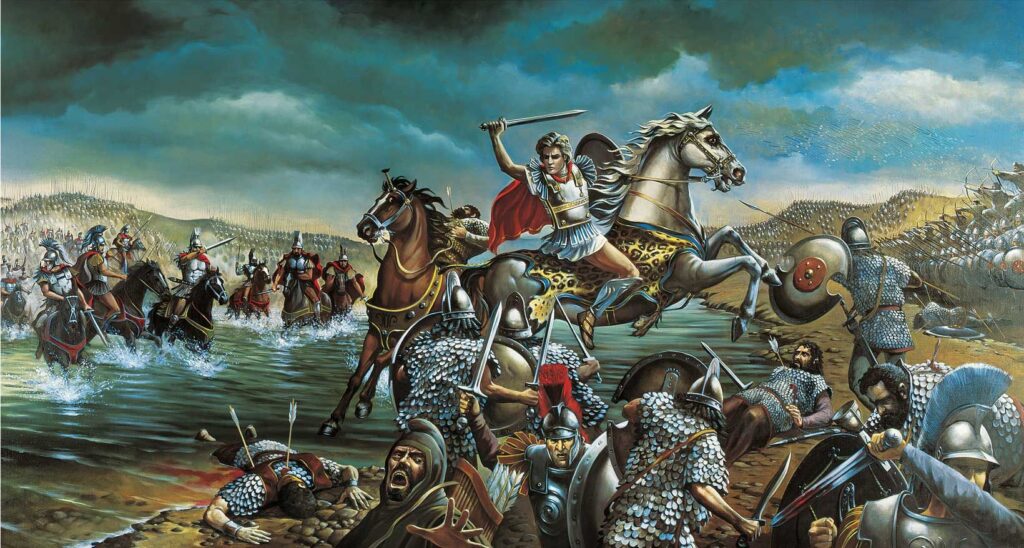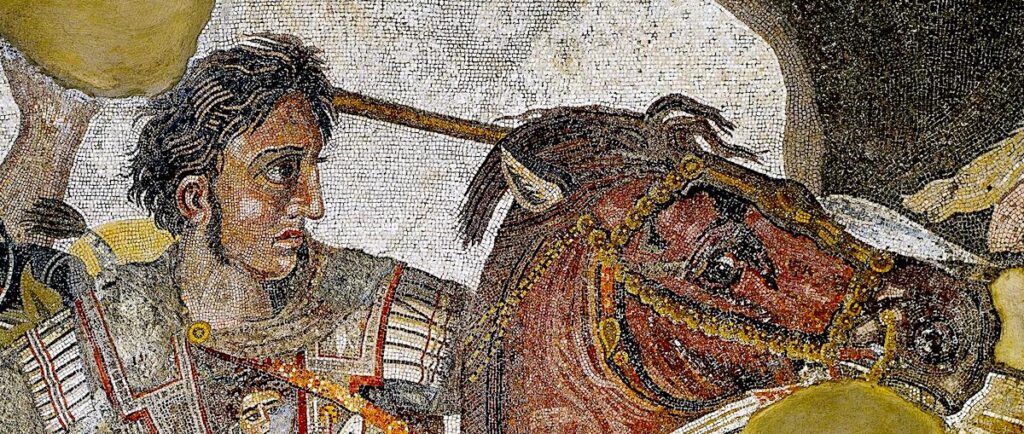Alexander was the king of Macedonia from 336 to 323 BC and considered as ‘Midas touch’ in battles. During his reign, he united Greece, reestablished the Corinthian League, conquered the Persian Empire and had spread almost to Indus, India. Starting from his acquisition of throne at 20, he accustomed victory after victory till his death and so called as “THE GREAT”. His life was filled nothing but only with battles and triumphs. Having this reckless attitude of hooking to campaigns, he could be conferred as “The Ancient Captain America”, colloquially.
He conquered as much bloodsheds which is fathomed in history. This blog deals in the notable pointing happenings of the ‘great’ by 20 points, hoping to ease it to read. Let’s get into the topic!
20 Points on the Great Alexander
- Alexander was born in 356 BC in Pella to the couple King Philip II and Olympias. Alexander was believed to be own son of Zeus(Sky & thunder god of Ancient Greek Religion) since, Olympias once dreamed of getting the womb by a thunderbolt struck on to her body that is bound to spread ‘far and wide’ before dying away and Philip II had a dream of securing the womb which is sealed with lion’s image, according to Plutarch, ancient Greek biographer.
- Philip II gifted Alexander a horse named “Bucephalas” when he was 10. Bucephalas was his companion all through his life; it carried him to the extent of conquering North-western India. The great named a city after it, ‘Bucephala’.

- He was tutored at his early ages by Leonidas, a relative of his mother and by Lysimachus of Acarnania. He was then under tutelage of Aristotle during his 13-16 years at the Temple of Nymphs at Mieza. His fellowmates in Mieza, Ptolemy, Hephaistion and Cassander later became his companions. Here, Alexander was tutored about medicine, philosophy, morals, religion and art. This was a carving phase of his life.
- Alexander was first acquainted with Persian exiles at the Macedonian court, who received the protection of Philip II for several years. This intent was a good thriving one to quell Persian empires for him.
- The one-dark eyed and curly headed Alexander seldom saw his father as he was full in stretch of triumphing nations, but he was as superior to his father, whom he worshiped for his braveries.
- The waging war in Byzantion, made Philip II to hold Alexander as regent. This had endorsed Alexander to mark his first military expedition and victory. Alexander smashed Thracian Maedi off and drove off them from their land, when they revolted against Macedonia troops. He named that city after him, “Alexandropolis” and colonized greeks.
- The Battle of Chaeronea was a father & son battleship with the opponent, as the two led the troops in hand, and seen a great victory. This had led the Philip’s trusted generals to awe at the son’s efforts.

- Returning to Pella, Philip II fell in love with Cleopatra Eurydice in 338 BC, niece of his general Attalus. At the wedding, drunken Attalus prayed openly to gods for wanting a child from Cleopatra as the heir of Philip II. This led to a clash, after which Alexander dropped his mother Olympias with her brother, Alexander I of Epirus in Dodona; and he reached Illyria and sought refuge from the kings. The clash was been for 6 months.
- In 336 BC, at wedding of his daughter Cleopatra to Olympias brother Alexander I, Philip II was assassinated by their own captain of bodyguards, Pausanias. At the vent of escaping, Alexander and his companions Perdiccas and Leonnatus killed Pausanias. The nobles and the army proclaimed Alexander as the King on the spot of the incident, in approval of Alexander’s seek. Alexander became the King in his age 20.
- Alexander to conquer the throne, decided to kill Philip’s potential heirs by help of the generals whom assisted him in Chaeronea. Of those includes his cousin, two Macedonian Princes. Olympias, being a loyal mother to his son, slaughtered the daughter of Cleopatra-Philip and drove Cleopatra herself to suicide. Alexander also murdered Attalus, who was suspected of defecting to Athens.
- Balkan Campaign: While riding east for attack on Thracians, then on Triballi, Danube and Getae Tribes, the king was cognizable about the revolt of Cleitus, King of Illyria and Glaukias, King of Taulantii against Macedonian. Straight-up to west to Illyria, Alexander screwed them to victories, securing his northern frontier. In time, Thebes and Athens again revolted, resulting in Alexander’s massacre of them. The campaign of Balkan exposes Alexander as a reckless military commander in history. Meanwhile, Alexander’s general Parmenion had already made his way to Asia Minor.
- In 334, Alexander embarked on his Asiatic expedition, arriving in Troy that spring. Alexander then faced Persian King Darius III’s army near the Grancius River; Darius’ forces were swiftly defeated. In the summer of 333, the troops of Alexander and Darius once again went head to head in battle at Issus. Although Alexander’s army was outnumbered, he used his flair for military strategy to create formations that defeated the Persians again and caused Darius to flee. In November of 333, Alexander declared himself the king of Persia after capturing Darius and making him a fugitive.

- Alexander after capitulating to Egypt easily, Gaza was much challenging for him. The stronghold was fortified as hill and his engineers thought of impossible to ransack the mound. This lured the desire to go for it. The stronghold Gaza fell, after costing three failures and a severe strike on Alexander’s shoulder. He craved to possible, the impossible.
- Alexander then became the King of Babylon and The King of Asia. With these titles, he made a war on Porus’ armies in northern India and defeated them. Reaching Ganges river, his soldiers and troops refused to go farther to face larger armies. While returning along Indus, Alexander was injured by Malli Warriors.
- In view of securing the Greece territories and due to the vent of illness, injuries and death of Macedonian soldiers, Alexander planned to adopt Persian customs and introduce Persian officers in Macedonian state. Seeking to unite Persia with his state, he arranged a mass marriage between Macedonians and Persians which led to a cold criticisms of soldiers and the state people.
- After the dismissal of his closest friend Hephaistion in Ecbatana on due of illness or poisoning, Alexander was devastated. He was inferred with megalomania and paranoia after the death. Histories say that the closest friends might be involved in sexual behaviors, since the Greece had been free of those constrictions; but it is not hoped so.
- While considering the campaigns on Arabia and Rome, Alexander died on June 11 or 13(not sure) 323 BC in the palace of Nebuchadnezzar in Babylon at age 22. Two reasons account for his death; one being ill due to poison-fed as his close friend and the another due to advent of typhoid or malaria fever.
- Alexander was married thrice: Roxana, daughter of Oxyartes, out of love; Persian princesses Stateira II, daughter of Darius III and Parysatis II, daughter of Artaxerxes III. He had ‘self-constraint’ in the pleasures of the body, in contrast with his lack of self-control with alcohol.
- His military talents exposed highly at Granicus in the first battle of Asia, where he had small forces of 13,000 infantry with 5000 cavalry against a 40,000 Persian force. This had made him “One of the Best Military Commander in History”.
- He was highly responsible for the spread of Greek in the world and also the spirit of Panhellenism.






